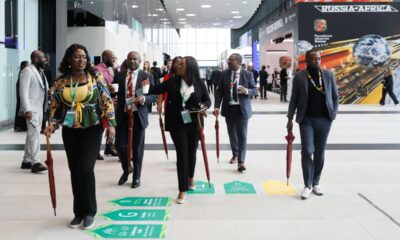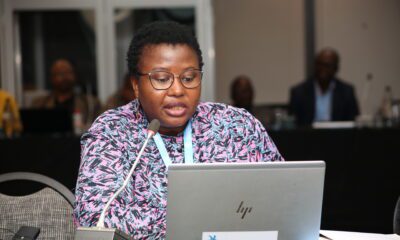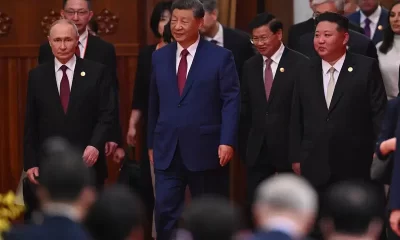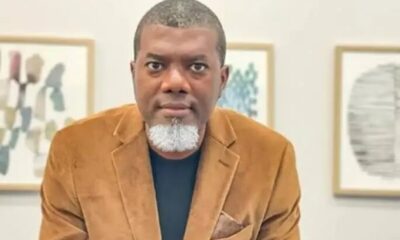Democracy & Governance
Voice for the Voiceless, the Uncelebrated Figures of the Nigerian Modern Democracy: Boss Mustapha –By Olusegun Bamidele Abejide
Is that not what Mr. Boss Mustapha who was trying to say so! Don’t get tangled up in little matters. In times of crisis, like the one we’re currently experiencing in Nigeria, we must immerse ourselves in historical perspectives. We can relive the events and people we read about by studying history. Revolutionaries and traitors are all around us. Vainglorious dictators and tragic heroes share the stage with us too. We get to know folks who wanted nothing more than to live peacefully but were forced to endure hardships in their lives. We relish the sweet relief from the scorching sun that comes in between apparently unending periods of fighting.
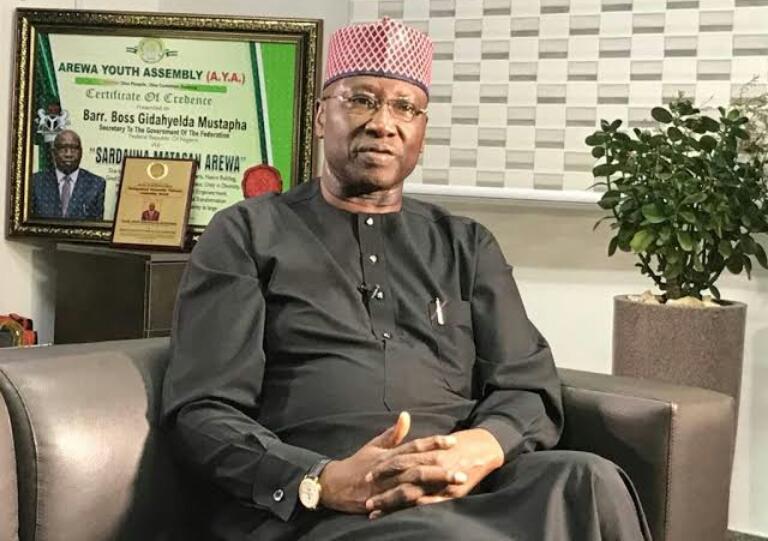
A CASE STUDY OF BOSS GIDAHYELDA MUSTAPHA
In 1979, ambitious and young Mustapha graduated from Ahmadu Bello University with a Bachelor of Law (L.L.B). After graduating, it was about getting a job and living a great life. Since he is an industrious person, he joined the mandatory National Youth Service Corps (NYSC). This set him on a healthy career path, which eventually made him a great and successful person he is today.
Even though Nigeria was under military rule during his early age, Mr. Boss Mustapha industriously worked hard to make a living. Through his sheer devotion to succeed in life, he is now a man we can respect in society. He has achieved in his career significantly, and today he is a management consultant, businessman, and politician. There is a lot to admire from Mr. Mustapha, who continues to epitomize what real hard work can do to someone’s life. He is a self-made man who believes in life being a journey that an individual has to accept its challenges to succeed.
His service to the country has been exemplary in so far, he has served in large organizations. He has also practiced his law in Lagos, especially at law firm-Messrs Onagoruwa &Co. His legal expertise is majorly in a business where he focuses on government parastatals, the Liberalization of Public companies, and privatization.
With a law career spanning 40 years, Mr. Mustapha has displayed brilliance and intelligence in his area of legal expertise. He has demonstrated that he is a brilliant mind that the young generation should look up to. Above all, he has the interests of Nigerians at heart, and his continuous fight for social justice underlines that. He is among the few influential Nigerians that firmly believe in the reconstruction of our country. He agrees that Nigeria has made tremendous steps in developing the economy and solving its internal problems. However, he believes that more needs to be done to secure the future of many Nigerians who have been left behind.
He agrees that a high population of Nigerians has been excluded from the country’s development. In as much as Nigeria has been making remarkable progress, a majority of its population is at the bottom of the pyramid, struggling to afford basic needs. In his view, the country’s leadership needs to look at how to lift the poor to a level where they can afford the bare minimum like housing, food, and clothing.
MUSTAPHA-THE BOSS
In many instances, Mr. Mustapha is not known by his official name. He likes leading and making decisions that impact a majority. Mustapha alias “Boss” leads those from the bottom to the top. By wanting to be identified Boss, he does not mean that people should consider him above others. He wants people to see him as a leader on many fronts.
In legal practice, business, and social activism, he should be the one to lead. He has dedicated his full life to fighting for people. Although some Nigerians lack full knowledge of his contributions, his unwavering support for the underprivileged Nigerians is unmatched. He upholds the belief that despite society being unequal, it should create opportunities for all people. It is an injustice for a few people to thrive while leaving millions at the bottom of the social ladder.
We should all afford a decent living even if we cannot all belong to the same social class. He borrows his thinking from his business interests. As a businessman, he believes in providing goods and services that meet the needs of people while transforming society. Companies need buyers to thrive, and there must be meaningful cash flow or income among consumers for businesses to succeed and contribute to nation building. Businesses are profit-oriented, but through the triple bottom line, they have a social pillar that concentrates on solving social problems facing society.
The social pillar targets areas that affect vulnerable individuals in society. Businesses commit to their corporate social responsibility because they have a sense of belongingness to the community. Even when stakeholders like shareholders want dividends or high return on investments, businesses feel the need to help communities that consume what they produce. It is the belief that firms exist to make profits and improve the living standards of others that has been the driving factor for Mustapha’s commitment to the business.
As lawyer-cum-businessman, he believes that by creating an enabling environment for businesses to thrive, Nigeria shall be in a critical position to improve the lives of many citizens who feel that for a long time, they have been neglected. As a Boss as he is, he has taken the mantle to lead and inspire Nigerians to think positively and build up positive energy that will drive them to success. He dislikes lamentations, but positive thinking, which he believes is the lifeblood of any individual that wants to succeed. People should not feel that their situations are permanent; instead, they should demand meaningful change that allows businesses to perform and create jobs and reconstruct our society.
STOP NEGATIVE THINKING
In my high school life, motivational speakers could inspire me to get up very early in the morning to study. They gave me the energy that I urgently needed to fire up the spirit of success that was literally dormant in my body. There is negative energy that destroys us, and if we are not careful, it can fail us. I talked about my high school life, where I could be motivated to read. I passed my exams because of that, and we should be keen on what we feed our unconscious minds. The build-up of negative energy consumes our dreams and leads us into oblivion and failure that we all try to run away from.
Have you tried to think positively? How do you feel when you remain optimistic? Ponder about it. Boss stresses, “I am a firm believer of the mind being the determinant of what we become.” “The mind represents our lines of thought,” he added. These two statements from Boss require us to be introspective. When we are negative in our minds, everything fails. The government fails. Legislators fail, the country becomes divided, and we stick to lamentations that cannot solve our problems. Mustapha considers that the change Nigerians desire should begin from the mind. Citizens and their leaders should embrace positive thoughts. Boss, “Remember, U.S. President Barack Obama ran his campaigns on hope in his first run for the top seat. Hope easily drove him to victory.” When I heard this pronouncement from Boss, I now understood why he does not like negative people around him.
During his 65th birthday, I was left in deep thoughts when Boss cautioned Nigerians to stop complaining that their country is not working for them. Some people took this statement lightly, but I took it seriously because I know what Boss stands for; he and I had once discussed many of sorts when we met in Dallas, Texas, in 2009. So, hearing this from him while serving as the secretary to the government of the federation (SGF) is not new to me. You can think that he is defending the government, but if you appreciate his philosophy of life, he does not like negative energy centered on criticism only. Nigerians should renew their dedication to the development and growth of the country. This is a positive statement that must always linger on our minds. When people feel that they have a role to play in nation building at their own individual level, we can succeed as a country. This calls for Nigerians to change their lines of thought and believe that it’s not just a government that brings change, but citizens are powerful in all dimensions.
In many cases, citizens like to complain about their government. But in this case, Mr. Mustapha is challenging us. We are the people that elect the current government, and we shall continue to elect leaders to form future governments. Unless we, the citizens, begin to take responsibility for our decisions, it would be difficult to achieve anything as a country. When we leave a few people to control our lives while doing nothing to speak about what we want, we shall always complain about our country failing us; instead, it is us failing our country.
Boss Mustapha continues to warn us that the power in the tongue can build or destroy us. The mind begets what the tongue lets out through speech. He once emphasized, “You see the power of life and death is in the tongue. What you say about your country is what you get.” “This is our country, he continues, where everybody has the opportunity to ventilate aspirations,” insists Boss Mustapha. I like how he shares his powerful thoughts, which shape the state of our minds. In many instances, we are used to looking at situations from a negative perspective, which could be why our circumstances are not changing. However, Boss is giving us a new way of thinking to achieve what we want our country to be.
In the wisdom of Mr. Boss Mustapha, “We must, at this point, imbibe the core values of democracy by respecting each other’s rights and pursuing individual goals in tandem with our national objectives for a better Nigeria.” This is a powerful persuasion that should get Nigerians in droves to live harmoniously while pursuing democracy. The time for fighting and blame games is over; it is time to act and deliver positive results.
RECONSTRUCTION OF NIGERIA
Apart from changing our perception or thinking, Mr. Mustapha Boss highlights two other significant areas we need to address as a country to attract direct foreign investments. Tackling corruption and insecurity need to be the collective effort of the government and the citizens. Regrettably, greed and corruption are tainting the image of Nigeria beyond its national scene. On the international stage, people are scared of the level of corruption in our country. Corrupt practices injure the image of our country to the degree of discouraging investors. If we allow corruption to thrive, foreign investors cannot easily invest in the country.
In 2015, Mr. Mustapha inaugurated the Economic and Financial Crimes Commission (EFCC) board to step up the battle against graft. In all dimensions, corruption sends a negative image to foreign investors that our economy needs to create jobs. It is the onus of the government to fight corruption, but this should be a battle viewed collectively. We should all join the government to root out corruption. There must be a collective effort and support from citizens to fight graft. In many African nations, the fight against corruption has been sabotaged by citizens and politics. In many instances, when the corrupt are arrested, they identify themselves by their ethnic communities to seek sympathy and support. In an unfortunate circumstance, the community rallies behind their tribesman to support them instead of letting the rule of law to take its course. However, wide-awakenings among Nigerians is needed to win the war against graft. The corrupt ones should not be allowed to be free but should be dealt with accordingly. High-profile people involved in graft should be punished heavily for deterrence.
Mr. Mustapha believes that it is high time we act decisively to win this war. Boss also notes that reconstructing our country further requires addressing insecurity. The military needs restructuring to achieve an end to the insecurity that is destabilizing the country. We have to be secure for foreign investors to have confidence in our country. When Nigeria addresses these critical issues, the road for meaningful development becomes more precise. Even though Boss Mustapha believes that the solutions for insecurity and corruption are not immediate, he wants the entire country to direct efforts at confronting these problems. Citizens have a civic duty to help the government tackle these issues until we find lasting solutions. Collectively, Nigerians can fight corruption and win against it. Also, insecurity will require precise and robust military action. This will make it easier for the Nigerian economy to revitalize and create more opportunities for millions.
MUSTAPHA’S VIEW ON HISTORY
It’s crucial to have a broader perspective of things. We’re more prone to get lost if we’re constantly looking at the ground as we walk. We must ensure that we are going in the proper way by looking up and selecting something big by which to orient ourselves. Consider our perspective if we were on top of a mountain, surveying the landscape below. It’s simple to see the path ahead from a higher vantage point.
Similarly, in life, we’ll get bogged down in minor problems if we always have a superficial viewpoint and pay attention to the inconsequential. Even the tiniest of obstacles will appear impossible to us. However, if we have a broad view of life, we’ll find the answer to whatever challenge we face. We can see this when we look at our societal issues or global issues.
“Leaders should study and read books on history,” the late Chief Obafemi Awolowo famously observed. Using history as a guide, we can better understand where society and the globe are heading and how we may assist in steering them on the right path.” Goethe, a German poet, also wrote:
He who cannot be farsighted,
Nor three thousand years assay,
Inexperienced stays benighted,
Let him live from day today.
Is that not what Mr. Boss Mustapha who was trying to say so! Don’t get tangled up in little matters. In times of crisis, like the one we’re currently experiencing in Nigeria, we must immerse ourselves in historical perspectives. We can relive the events and people we read about by studying history. Revolutionaries and traitors are all around us. Vainglorious dictators and tragic heroes share the stage with us too. We get to know folks who wanted nothing more than to live peacefully but were forced to endure hardships in their lives. We relish the sweet relief from the scorching sun that comes in between apparently unending periods of fighting.
Humanity has lost many brave souls because of irrational religious beliefs and the like that have since been disproved. In any case, we likewise see brave individuals who sacrificed their lives for a superior end goal. When we study history, we come across people who rose from the depths of despair to achieve the unthinkable. History is being played out in people’s minds as we observe this unfolding spectacle. With each passing scene, our thoughts naturally shift to an expanded perspective as we watch it. We can nearly feel the breeze in our hair as we take off along the mighty stream of humanity’s set of history. All of our past, present, and future are laid bare for us to view. Our roots are in the past. Those who have taken the time to study history in depth come to understand who they are and where they’ve come from. History is a window into one’s soul. The more one knows about oneself and human nature, the more accurate one’s perspective of history will be. This is how we learn about the history and the world around us. We can gain tons of valuable knowledge about human conduct and standards of conduct from an earlier time.
For example, even if it is impossible to anticipate the weather accurately, we may foresee trends based on statistical data and likelihood. While the human heart can be unexpected, there are patterns and probabilities in human behavior that can be seen through the lens of history. Humanity is examined through the study of history. We must use the past as a guide to help us shape the future, even if we cannot all be historians of the highest caliber. You, the protagonists of today, will write a new history. In the absence of a mirror, it is impossible to see your face or that of those who have pushed Nigeria to its current position. You may also see what has to be done to improve Nigeria by using the mirror of history.
Chief Awolowo once again emphasized the relevance of history. To help us progress from the past to today and the future toward the ideals of peace and harmony, he added, history is a signpost that helps us proceed with greater clarity. A single person can’t take in all of recorded history at this point. As a result, even if we do not fully comprehend the current state of affairs in the country, we must maintain a clear historical perspective and grasp of fundamental historical principles. To avoid a repeat of the dark and deadly history of humanity as it is now in the country, we must be aware of our negative tendencies and be on the alert for them. To keep committing atrocities that have already been engaged in the past shows an inability to learn from past mistakes. It is crucial an incredible arrangement how one deciphers history. “When leaders have a misguided vision of history, numerous strongly negative influences result, and they in turn push society in an even more mistaken direction,” Chancellor Wang Gungwu of the University of Hong Kong once clearly spelled it out.
Dr. Olusegun Bamidele Abejide
Ambassador-at-Large
International Human Rights Commission (IHRC-USA & NIGERIA).
(Courtesy: A PRE-BOOK LAUNCH CHAPTER EDITION).

